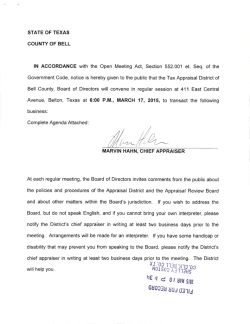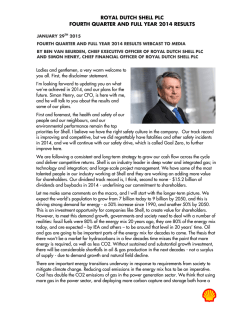
Gov`t Probe of Evertec Part of `Monopoly Alert`
16 February 5-7, 2016 The San Juan Daily Star Gov’t Probe of Evertec Part of ‘Monopoly Alert’ By MARIA MIRANDA SIERRA [email protected] ESTADO LIBRE ASOCIADO DE PUERTO RICO JUNTA DE CALIDAD AMBIENTAL AVISO AMBIENTAL SOBRE INTENCIÓN DE OTORGAR UN PERMISO PARA CONSTRUIR UNA INSTALACIÓN DE DESPERDICIOS SÓLIDOS NO PELIGROSOS El Sr. Jassiel Torres, dueño de la instalación J.WOODEN PALLETS, localizada en la carretera Carr. 2 krn. 67.7, Bo. Santana en Arecibo, Puerto Rico, ha sometido ante la Junta de Calidad Ambiental una solicitud de permiso para construir una instalación para el acopio y procesamiento de desperdicios sólidos no peligrosos (paletas de madera desechadas, mulch), a tenor con las disposiciones de la Regla 641 del Reglamento para el Manejo de los Desperdicios Sólidos No Peligrosos (RMDSNP). La instalación para el acopio y procesamiento de desperdicios sólidos no peligrosos consiste en el almacenamiento, manejo y trituración de madera desechadas. Luego de realizada la evaluación de los documentos sometidos, esta Junta notifica su intención de emitir el permiso de construcción solicitado al amparo de la Ley sobre Política Pública Ambiental. El RMDSNP establece en el Capitulo IX el requisito de solicitar un permiso como condición previa a la construcción de una instalación de desperdicios sólidos no peligrosos, el cual es aplicable a dueños u operadores de estas instalaciones. La solicitud del permiso de construcción, así como el Borrador de Permiso y otros documentos relevantes, están a la disponibilidad del público para ser examinados en la Oficina Regional de Arecibo de la Junta de Calidad Ambiental, ubicada en la Ave. San Patricio #44, Carretera PR-2, Km 80.6 en Arecibo. Copia de. dichos documentos pueden adquirirse a $0.50 por pliego en la oficina antes mencionada, de lunes a viernes de 8:00 A.M. a 4:30 P.M., o escribiendo a.: Junta de Calidad Ambiental, Oficina Regional de Arecibo, P.O. Box. 143971, Arecibo, P.R. 00614-3971. La. Regla 649 del RMDSNP requiere la publicación. de este Aviso y regula la celebración de Vistas Públicas, las cuales podrían ser efectuadas de considerarse necesarias por esta Junta o por peticiones fundamentadas recibidas durante el período comprendido para comentarios. Cualquier comentario o petición de vista pública deberá someterse por escrito dentro de treinta (30) días a partir de la publicación de este Aviso, a: Junta Calidad Ambiental Oficina Regional de Arecibo PO Box 143971 Arecibo, PR 00614-38711536 Junta de Calidad Ambiental Oficina Central PO BOX 11488 San Juan, PR 00910 La fecha límite para someter comentarios puede ser extendida si se estima necesario o apropiado para el interés publico. La solicitud para una vista pública deberá establecer la naturaleza de los puntos de interés a ser discutidos en la vista. Weldin F. Ortiz Franco Director Ejecutivo Este anuncio se publica conforme a lo requerido por la Ley sobre Política Pública Ambiental, Ley 416 del 22 de septiembre de 2004, según enmendada y a las disposiciones del RMDSNP. El costo de este Aviso es sufragado por la entidad peticionaria. OFICINA REGIONAL DE AREClBO Ave. San Patricio #44, Carr. 2 Km. 80.6 Arecibo, PR PO Box 143971, Arecibo, PR 00614-3971 Tel. (787) 880-5140, (787) 880-0013 Fax (787) 879-5329 www.jca.gobierno.pr JCA JUNTA DE CALIDAD AMBIENTAL Estado Libre Asociado de Puerto Rico S ince the new calendar year started, the commonwealth Justice Department’s Office of Monopoly Issues has been investigating electronic payments company Evertec to see if it has engaged in behavior on the island that violates the Monopolies and Restriction of Commerce and Its Regulations Law, Justice Deputy Secretary Humberto Malavé said. Malavé said Justice began to investigate Evertec after electronic transactions at Puerto Rico’s businesses suddenly crashed on Jan. 9. Malavé made his comments at a public hearing at the Capitol building in the Puerta de Tierra sector of San Juan. “We started a formal investigation to determine if Evertec has indeed carried out any conduct that harms competition in terms of products and services offered and which constitute a violation of Law 77 of 1964 as amended, also known as the Monopolies and Restriction of Commerce and its Regulations Law,” he said. Malavé added that Justice opted to begin the probe out of “motu propio,” as the law enforcement agency had not received a complaint against Evertec. He added that he couldn’t get into specific details because Justice Department investigations are confidential, but he did note an existing “monopoly alert” given that the company acknowledged in public hearings that it controls 80 percent of the market. Meanwhile, Evertec Vice President of Communications and Marketing Alan Cohen said on Thursday the company will cooperate with the probe. According to an Inter News Service report, Cohen said in a written statement that “Evertec faces competition from local, regional and global businesses in the electronic payments industry, in addition to services involving cash, checks, ATMs and other payment methods.” “We meet with all federal and local applicable laws,” Cohen said. “Evertec continues to focus on providing their customers processing services of high quality at competitive prices in this industry highly regulated by the federal government.” On Jan. 9, electronic transactions at Puerto Rico’s businesses suddenly collapsed. Consumers trying to pay for items with their ATM or credit cards were forced to leave the items behind unless they had sufficient cash on hand to pay for the transaction. Not only were transactions not working at businesses, but they were interrupted at the island’s banks as well, meaning that consumers could not withdraw cash from an ATM to pay for the items they wished to purchase, but rather had to leave the establishment empty-handed. In public hearings in late January, Evertec certified before the Senate Consumer Affairs Committee that there was no loss of data during those two hours in which the clients had no service, because the problem was not caused by hackers, but rather by equipment that crashed. As for the allegations of monopolistic practices by the company, Evertec Vice President Carlos Ramírez said “we have a dominant position in the market and we are competitive.” Ramírez said his company’s competitors include Visa and Mastercard, both of which are expected to participate in public hearings shortly as well. The San Juan Daily Star February 5-7, 2016 17 Royal Dutch Shell’s Profit Down 56% on Slumping Oil Prices By STANLEY REED R oyal Dutch Shell became the latest big energy company to file a damage report on the impact of depressed oil prices, saying on Thursday that its adjusted profit fell 56 percent in the fourth quarter of 2015 compared to a year earlier. But the company’s stock rose about 5 percent in Amsterdam trading, as Shell said it would maintain its dividend, paying out at least $1.88 a share for 2016. Promising to continue to pay dividends, which some other big petroleum companies have also pledged to do, is one of the few ways to reward investors during the industry’s lean times — although some analysts question how long the payouts can be sustained if oil prices continue to languish. Shell said earnings adjusted for inventory changes were $1.8 billion, down sharply from $4.2 billion in the comparable period of 2014. For all of 2015, its earnings fell 80 percent to $3.84 billion, compared with $19 billion in 2014. Mr. van Beurden said that Shell had already cut about 7,500 full-time and contractor positions and that an additional 2,800 jobs would be eliminated from the two companies after the merger. He also promised “impactful decisions” on matters like capital spending. In an immediate move to preserve capital, Shell said it would postpone two major projects: a liquefied natural gas facility in Canada and a deepwater oil and gas development off Nigeria. “We are making substantial changes in the company, “ Mr. van Beurden said, “as we refocus Shell and respond to lower oil prices.” Shell’s diminished earnings are the latest sign of how plunging oil prices are cutting sharply into the profits of the oil majors. Chevron last week reported its first quarterly loss since 2002. BP on Tuesday reported a $3.3 billion fourth-quarter loss. Exxon Mobil on that same day said that its profit for the quarter had declined 58 percent. For Shell, despite the cushioning effects of its large refining and chemicals business, the falling prices of oil and gas are still doing damage. Each $10 a barrel change in the oil price, the company says, has an impact of about $3.3 billion on annual earnings. Shell had forecast gloomy earnings two weeks ago, before the vote by shareholders on the proposed acquisition of BG. A few days later, investors approved the acquisition. Shell estimated on Thursday that its reserves of oil and gas still in the ground and under the sea floor, fell by 1.4 billion barrels in the past year, to 11.7 billion barrels, as falling prices had prompted the company to remove some of them from its books. To assure future operations, oil companies need to add to their reserves to replace production. That is one reason Shell has been intent on acquiring BG Group, which would add an estimated 3.6 billion barrels of reserves. Shell produced 1.1 billion barrels in 2015. With petroleum prices down about 70 percent over the last 18 months, the oil industry is experiencing its most brutal downturn since the late 1990s. That period, a time of widespread job losses among oil companies, was a time of industry consolidation, as BP acquired Amoco and Exxon merged with Mobil. Back then, Shell stayed on the deal-making sidelines. But during the current downturn, the company has been the only big oil company to make a bold move in buying BG Groupfor cash and shares now worth about $50 billion. That deal proved divisive with investors, some of whom worried about Shell making a large takeover at a time when oil prices were still on the way down. Mr. van Beurden has long tried to persuade investors that the BG acquisition is not an expensive gamble but rather an opportunity to choose the best of both companies and to cut jobs and expenses like exploration. BG will also raise Shell’s status as Europe’s largest oil and gas company. But that distinction may be difficult to celebrate at a time of falling fuel prices. Big oil companies have responded to plummeting prices by cutting capital spending and operating expenses. But with prices lower than most forecasts, analysts and rating agencies are beginning to argue that Shell and other companies may need to go much further. On Monday, the credit rating agency Standard & Poor’s downgraded Shell’s long-term credit one notch — to A+ from AA- — and put five other European oil majors, including BP and the French company Total, on watch for similar potential downgrades. In explaining its downgrade of Shell, S.&P. said it expected the company to generate significantly less cash than it planned to pay out in dividends and capital expenditures through 2017. The agency also said that Shell might be further downgraded after the completion of the BG acquisition. “We now believe many major oil and gas companies’ current and prospective core debt coverage metrics are likely to remain below our rating guidelines for two or three years as the industry adjusts to lower prices,” S.&P. said in a statement. The pressure on the companies’ earnings also raises questions about whether they can continue to pay the generous dividends that are now a crucial attraction for investors — particularly if prices remain in the current range of $30 a barrel, or even lower. BP, in announcing its big loss on Tuesday, said it would continue its 10-cents-a-share dividend but planned to review it each quarter. In a note to clients on Wednesday, Biraj Borkhataria, an analyst at RBC Capital Markets in London, wrote that “2016 is likely to be a year of transition for BP with limited ability” to cover its dividend unless oil prices rose substantially. So far, most oil company chiefs have stuck by their commitments to continue paying dividends. But the dividends, which cost the companies billions of dollars each year and were set when oil was selling for more than $100 a barrel, could prove hard to sustain. 18 February 5-7, 2016 Stocks The San Juan Daily Star Market Inches Higher as Investors Await Jobs Data S tocks ended modestly higher after a day of wobbling between slight gains and losses. Materials companies notched some of the biggest gains Thursday as prices for metals and other commodities ended mostly higher. Copper miner Freeport McMoRan jumped 18 percent and metals maker Alcoa rose 10 percent. Retailers lagged the market. Ralph Lauren plunged 22 percent after its revenue fell short of forecasts. Kohl’s sank 19 percent. The Dow Jones industrial average rose 79 points, or 0.5 percent, to 16,416. The Standard & Poor’s 500-stock index edged up two points, or 0.2 percent, to 1,915. The Nasdaq composite climbed five points, or 0.1 percent, to 4,509. Bond prices rose. The yield on the 10-year Treasury note fell to 1.86 percent. RETAILING WOES Retailers had some of the biggest losses. Shares of Ralph Lauren plunged 17 percent after the company’s revenue fell short of forecasts. Kohl’s shares also sank 17 percent. OFF-CAMERA GoPro stock tumbled 8 percent after the company issued disappointing results. RATE RETHINK Investors are preparing for today’s payroll numbers. Over the last couple of weeks, they have scaled back expectations that the Fed will continue gradually raising interest rates amid signs that the global slowdown in growth is beginning to hurt the American economy. On Wednesday, for example, the private Institute for Supply Management survey found that services companies in the United States grew in January at the slowest rate in nearly two years. Economists surveyed by FactSet forecast that employers created 200,000 jobs in January and that the unemployment rate held steady at 5 percent. ANALYST’S TAKE “The market is starting to price in a small chance of recession, not some realistic chance, but enough of a chance to give investors pause and reposition,” said Khoa Le, who co-leads a derivatives trading desk at Credit Suisse. RETIREMENT PARTY CBS and Viacom shares were up 1 percent each after Viacom announced that its 92-year-old majority shareholder, Sumner Redstone, was stepping down as executive chairman of Viacom and of CBS. Les Moonves, the chief executive of CBS, will succeed him at CBS, and Philippe P. Dauman, the chief executive of Viacom, will succeed him at that company. EUROPEAN MARKETS In Germany, the DAX fell 0.4 percent, and in France, the CAC 40 edged up 0.04 percent. The FTSE 100 was up 1 percent in Britain. CURRENCIES Diminished expectations of a March Fed rate increase have hurt the dollar. The euro was up 0.8 percent at a three-month high of $1.12, while the dollar fell 1.1 percent to 116.78 yen. ENERGY Benchmark U.S. crude edged down 60 cents to $31.68 a barrel on the New York Mercantile Exchange. The contract jumped 8 percent on Wednesday in New York. Brent crude, a benchmark for international oil prices, fell 69 cents to $34.20 a barrel in London. MOST ASSERTIVE STOCKS PUERTO RICO STOCKS COMMODITIES CURRENCY LOCAL PERSONAL LOAN RATES LOCAL MORTGAGE RATES Bank FHA 30-YR POINTS CONV 30-YR POINTS BPPR Scotia CooPACA Money House First Mort Oriental 3.00% 3.50% 3.50% 3.75% 3.50% 3.50% 0.00 0.00 2.00 2.00 0.00 0.00 3.50% 4.00% 3.75% 3.75% 5.50% 3.75% 000 0.00 2.00 2.00 0.00 5.50 Bank PERS. CREDIT CARD AUTO BPPR --.-- 17.95 4.95 Scotia 4.99 14.99 4.59 CooPACA 6.75 9.95 2.95 Reliable --.-- --.-- 4.40 First Mort 7.99 --.-- --.-- Oriental 4.95 9.99 7.09
© Copyright 2026



